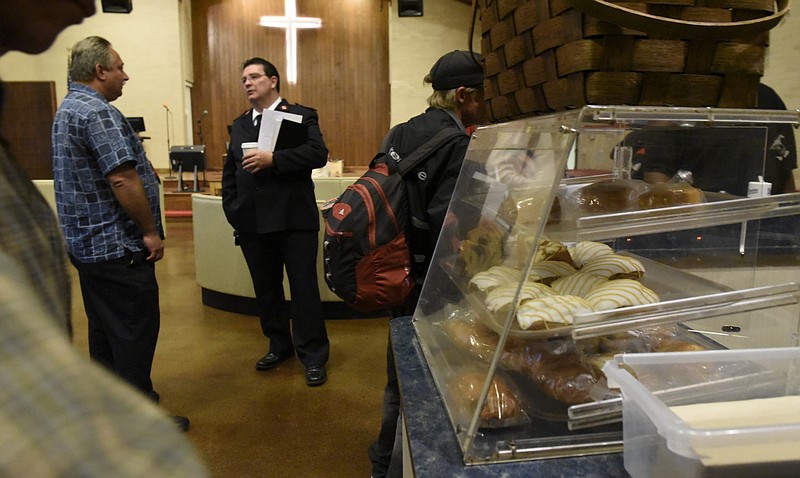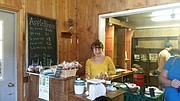Federal law protects Food Donors
› The laws: To find out more about the laws surrounding donated food, download the free Legal Guide to the Bill Emerson Good Samaritan Food Donation Act by James Haley of the University of Arkansas Law School at http://tinyurl.com/njc7h3o.› Local rules: Cities and towns may have specific regulations for donating food, and most of these rules are based on the Comprehensive Guidelines for Food Recovery Programs developed by the U.S. Department of Agriculture and the U.S. Food and Drug Administration in 2000 and updated in 2006. A free PDF of the guidelines is available at www.foodprotect.org/media/guide/food-recovery-final2007.pdf.
Potatoes shaped like Donald Trump. Peaches shaped like UFOs.
Such vegetables and fruits are the red-headed stepchildren of food, items nobody buys because they're weirdly shaped or funny looking or have blemishes. They usually end up in the trash, even though they're perfectly edible.
Then there are the cases where a grocery or restaurant simply orders too much food and the sell-by date comes and goes without the items being sold. Into the dumpster they go.
Many of these businesses would gladly donate the excess food or spooky-looking food to shelters or schools, but officials say they're afraid they might get sued if someone claims to get sick from the donations. Since 1996, however, the Bill Emerson Good Samaritan Food Donation Act has said that, to be legally liable, a food donor would have to exhibit gross negligence by offering spoiled or dirty food.
Still, homeless shelter pantries in town have empty fridges and bare cupboards, and the U.S. Department of Agriculture reports that 1 in 9 U.S. families have no idea how they will pay for this week's meals. And, according to the Natural Resources Defense Council, a nonprofit environmental advocacy group, 40 percent of all U.S.-produced food is wasted.
But preventing good food from being thrown away has become a passion both nationally and here in Chattanooga for activists, chain restaurants and family farms.
The Maryland-based Food Cowboy is trying to reduce the amount of food that's wasted with an app. A mobile sensory device - think of it as a tiny thermometer and phone combo - travels inside a big rig's refrigerated trailer hauling produce. If the temperature gets too high or too low for too many minutes, the device alerts the produce buyer, who is usually in the headquarters of a chain store like Whole Foods or Costco.
Organic blueberries, for instance, are the Nicki Minajs of the fruit world, pop star divas that command high prices and gobs of attention and care. The berries are still tasty and nutritious and OK to eat, but the temperature change just might mean the fruit's flavor intensity or firm texture is diminished, enough for the buyer to decide he doesn't want them anymore.
"The buyer can call the trucker and say, 'Hey, I got an alert there was a problem with the storage temperature, so I don't want them,'" explains Roger Gordon, who created the Food Cowboy app with his brother, Richard, and a team of tech wizards. "The trucker has a small window of time in which to deliver organic blueberries at maximum freshness. If he can't find a buyer, he really can't afford to store the berries himself, so he might have to discard them at a dump or landfill."
How to Use the Food Cowboy App
* A charity food bank can register itself on the Food Cowboy website. After Cowboy verifies the charity’s credentials, it can use the free app.* Truckers can register on Food Cowboy’s website, too. Say a trucker must donate a food cargo, for example, because his truck broke down in Chattanooga and he will miss his Florida buyer’s delivery deadline. The trucker can put out an alert via his app, saying he has dozens of gallons of chocolate milk that he needs to donate within 48 hours. Chattanooga food banks that use the app get the message and can make delivery arrangements with the driver.* Food wholesalers and distribution hubs can also register. Often they will get crates of mint-condition produce back from a store simply because the store is overstocked.* If a Chattanooga charity contacts a driver, please let them know whether the food pantry has a loading dock where he can give them the donated cargo and whether the parking lot is big enough for a big rig to turn around in completely,” says Roger Gordon, who helped develop the app.
The Gordons say Food Cowboy is perfect for cities like Chattanooga which are located on interstate highways, the country's major shipping arteries. Roger Gordon was a long-distance trucker for years as he earned his master's in business administration from Northwest University's Kellogg School and a law degree from Georgetown University. Richard Gordon, meanwhile, has decades of experience in trucking and trucking terminal management, enough that he is a go-to guy for the Federal Emergency Management Agency when it needs logistical advice after hurricanes and floods.
Still, the Food Cowboy app may seem like a tiny dent in a mammoth problem, given the mountainous landfills and amount of food that's dumped in them. The Defense Council reported that all that rotting food in such dumps generates greenhouse gases with 21 times the impact of carbon dioxide on climate change.
But many links in the Chattanooga-area food chain already are doing whatever they can to prevent food waste. At Wheeler Orchards in Dunlap, Tenn, Jennifer Steinhice's family owns the farm that produced apples and grapes for generations. She recently hosted the third annual Taste Buds farm tour in which visitors travel to local farms to learn more about producing food, avoiding waste and eating well. She wore an elegant gold-lace vintage dress as she served up pies, scones, butter, jams, cider, salsas and sauces, soothed squealing kids and shushed barking dogs outside the farm store's door.
"We do everything we can to avoid wasting any fruit, and my great-grandmother's recipes are a big help," Steinhice says, offering a cracker loaded with her great-grandmother's sweet, savory and rich Apple Tomato Onion Hash. "We sit around the table, carving out the blemishes and bruises from peeled apples then chopping them up for all the treats we sell in the store."
Steinhice says apples too bruised for humans are sent to an organic farm for the pigs to eat.
Grocery store food waste gained national attention in France where supermarkets routinely pour bleach into food dumpsters to prevent the poor from scavenging for food. The country's National Assembly voted unanimously to require groceries that are 4,305 square feet or more to sign contracts with charities to donate unused food by July 2016. If they don't have that contract in place by then, store executives risk fines of $75,000 per incident or two years in jail.
Here in Chattanooga, some Bi-Lo stores, during the changeover to Food City, donated Southern Home products, Bi-Lo's personal brand, to daycare centers and homeless shelters.
Panera and Starbucks also offer their unsold bread and baked treats to the Salvation Army, which uses the bounty to give the homeless and impoverished something more than free food. After the Paneras and Starbucks close for the evening, employees carefully pack the unsold bread, brownies, cookies, Danish, lemon bars and other delights to keep them fresh overnight.
That same night, Lt. Ken Griffey, Jr. (not the baseball star) drives his minivan to the donor bakeries and picks up the boxed baked goods then takes them back to the Salvation Army on McCallie Avenue. It makes for a long night for Griffey, who may finish unloading after 10 p.m. He's back the next morning around 8 a.m. to get ready for free breakfasts.
On a recent morning, light streams through the McCallie location's stained-glass windows onto several tables encircled by leather booths shaped like half moons. Meanwhile, the shelter's six male residents sort the baked goods for display in clear plastic countertop cases. People filter in for a free cup of coffee and to choose buttered bread with jelly or a favorite breakfast sweet.
Griffey, the bread donors and bread sorters manage to make the morning meal far more than a breakfast. The Panera and Starbucks goodies are the centerpiece of a calm, dignified dining experience, something particularly valuable to anyone who feels engaged in a constant battle to survive or find a moment's safety.
Contact Lynda Edwards at 423-757-6391 or ledwards@timesfreepress.com.

